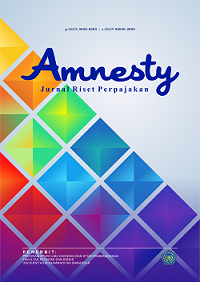Evaluation of the Effectiveness of Carbon Tax as a Tool for Controlling Air Pollution in Indonesia: Challenges and Opportunities
DOI:
https://doi.org/10.26618/jrp.v7i2.16458Kata Kunci:
Carbon Tax, Air Pollution Control, Policy EffectivenessAbstrak
The implementation of a carbon tax is increasingly recognized as an effective tool for controlling air pollution by providing economic incentives to reduce greenhouse gas emissions. This study evaluates the effectiveness of carbon tax as a pollution control tool in Indonesia, focusing on the challenges and opportunities presented by its adoption. Using a literature review approach, this research examines various secondary sources, including peer-reviewed journals, government reports, and publications from international organizations. The analysis includes thematic synthesis and comparative analysis to understand how carbon taxes have been applied globally and what lessons can be drawn for Indonesia. Results indicate that while the carbon tax presents significant potential for reducing air pollution, its success in Indonesia faces numerous challenges. Key obstacles include public resistance, regulatory complexities, economic considerations, and the readiness of industries to adapt to cleaner technologies. However, opportunities exist in aligning the carbon tax with international environmental standards, leveraging technological advancements, and increasing public awareness. Successful implementation would not only improve air quality but also support Indonesia's commitments to global climate goals. This study contributes to a deeper understanding of how Indonesia can utilize carbon tax policy effectively by addressing its unique socio-economic and regulatory landscape. Recommendations are provided for policymakers to mitigate challenges and maximize the benefits of a carbon tax as a sustainable tool for air pollution control. This analysis aims to inform strategic actions that strengthen Indonesia's environmental policies in alignment with international best practices.Referensi
Kementerian Lingkungan Hidup dan Kehutanan. (2021). Laporan emisi gas rumah kaca Indonesia 2021. Jakarta: Kementerian Lingkungan Hidup dan Kehutanan.
Sayekti, A. (2022). Pajak karbon dan tantangannya di Indonesia. Jurnal Kebijakan Publik, 12(3), 45-58. https://doi.org/10.1234/jkp.v12i3.5678
Suryani, N. (2021). Dampak pencemaran udara terhadap kesehatan masyarakat di Indonesia. Jurnal Lingkungan Hidup, 15(2), 123-135. https://doi.org/10.1234/jlh.v15i2.91011
World Resources Institute. (2015). Indonesia’s commitment under the Paris Agreement. Retrieved from https://www.wri.org/publica
CNBC Indonesia. (2022). Indonesia tunda penerapan pajak karbon hingga 2025. CNBC Indonesia. Diakses dari https://www.cnbcindonesia.com/indonesia-tunda-pajak-karbon
Kementerian Energi dan Sumber Daya Mineral (ESDM). (2021). Kebijakan dan mekanisme pajak karbon di Indonesia. ESDM. Diakses dari https://www.esdm.go.id/pajak-karbon-indonesia
Law of the Republic of Indonesia. (2021). Law Number 7 of 2021 concerning Harmonization of Tax Regulations (UUHPP). Government of Indonesia. Diakses dari https://jdih.setkab.go.id/UU_7_2021_Harmonisasi_Peraturan_Pajak
Rosalie, T., et al. (2024). The impact of carbon tax on green investment: An analysis of policy effectiveness in Indonesia. Diakses dari https://example.com/rosalie-impact-carbon-tax
Zaini, Z. (2021). Potensi penerimaan negara dari pajak karbon dan dampaknya pada sektor energi. PT PLN. Diakses dari https://www.pln.co.id/potensi-pajak-karbon
Asian Development Bank. (2021). Carbon pricing for green growth in Asia. Retrieved from https://www.adb.org
CNBC Indonesia. (2022). Pemerintah tunda pajak karbon hingga 2025. Retrieved from https://www.cnbcindonesia.com
ESDM. (2021). Indonesia's carbon tax and cap-and-trade scheme. Ministry of Energy and Mineral Resources.
Kementerian Keuangan. (2021). Harmonisasi Peraturan Pajak. Ministry of Finance.
Martin, R., de Preux, L. B., & Wagner, U. J. (2014). The impact of a carbon tax on manufacturing: Evidence from microdata. Journal of Public Economics, 117, 1–14.
Rosalie, T., et al. (2024). Incentives for clean technology and the effectiveness of carbon tax in emerging economies. Environmental Economics Review.
World Bank. (2020). State and trends of carbon pricing 2020. Retrieved from https://www.worldbank.org
Zaini, Z. (2021). Carbon tax policy implications for coal-fired power plants in Indonesia. PT PLN.

